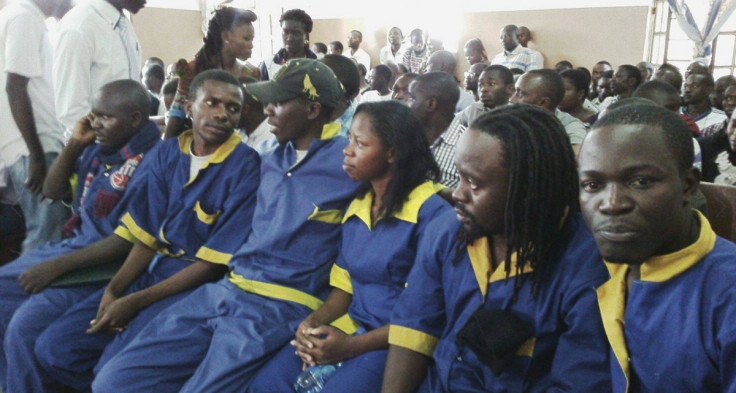Law and disorder in DRC: Lucha activists face 10 years in prison after clampdown on opposition

In one of the biggest debacles of the Democratic Republic of Congo's (DRC) judicial history, appeals for six pro-democracy activists from the anti-government Lutte pour Le Changement (Lucha) movement have suddenly and unexpectedly been brought forward to 3 March. Their jailing has been roundly criticised by the US, Belgium and France, as well as international human rights organisations.
Speaking exclusively to IBTimes UK ahead of the hearing, Lucha members said the public prosecutor is looking to extend and toughen the initial sentencing of two years' imprisonment, which was handed down on 24 February. They were jailed as part of a government crackdown on activists calling on the president, Joseph Kabila, to step down from power when his mandate expires at the end of this year.
"The lawyers had asked for an appeal on Saturday (27 February) and on Monday (29 February), when [government spokesman] Mende gave his press conference, we learned that the 'parquet' [public prosecutor] had also asked for an appeal," Lucha activist, Jean Bwenge said from Goma.
"It was another surprise when we heard this evening (Wednesday 2 March) that they were summoned to Court of Appeal tomorrow morning [at 9.00am local time 7.00am GMT], especially because the first sentencing has not yet been drafted."
Defence lawyer Maitre Matthieu Mugisho said: "We did not expect this and we don't understand anything about this case anymore because usually when someone appeals, the file is transferred to the court and to the judge who will sit on the hearing. Often in judicial practice in the DRC, everything is done to the diligence of the party that is appealing (Lucha in this case), and that demands that the hearing is set at a specific date and that the file is expedited from the district court to the High Court.
"However, in this case, there has been a clear precipitation on the behalf of the court that we do not understand," Mugisho continued. "Why are they organising a special hearing tomorrow at the court when typically, on Thursdays there are no penal hearings?"
Prosecution 'calls for 10 years in prison'
During the first trial, the prosecutor had asked for a 10-year sentence, accusing the Lucha members of attempting to breach state security. "This is a very serious political infraction," said Jean Mwenge, who added the infringement could be punished by "a few years in prison".
The activists' lawyers had appealed against the two-year sentence, instead asking for the accused to either be "acquitted or handed a reduced sentence". He said: "We believe that the public prosecutor would like to insist that the judges in the court of appeal sentence our friends to at least 10 years in prison."
A new verdict could either see the Lucha members acquitted or stuck with a two-year jail term. But a worst-case scenario could result in the current sentence being multiplied five-fold to 10 years in jail. The verdict is expected to be handed down on 3 March.
Mende's comments 'pose problem'
Earlier this week, the Congolese government criticised Belgium, France and the US for speaking out against the jailing of the activists, with spokesman Lambert Mende lambasting the Western nations for their "contempt for the constitution", seemingly ignoring accusations against incumbent Joseph Kabila of seeking to unconstitutionally clinch a third term in power.
Bwenge explained that Mende's comments could pose a problem. "It's not much that he said the international community could not denounce the decision which, according to him, comes directly from the Congolese, independent judicial system, but what's worrying is that he himself has intervened with regards to this case."
He added: "If he believes that foreign governments cannot intervene to comment [on] a decision of justice, then he, as government spokesman, should not have intervened because he is not a judicial spokesperson. He should have respected the principle of separation of the powers that is written in our constitution."
The issue with Mende's comments, Bwenge claimed, is that the spokesman "has confirmed this is not a judicial case, but a political one, and we are scared that the judges and magistrates who hears his comments on radio may not feel free to acquit our friends, because they know that this case is followed by the government - even if they do not receive direct orders."
This was echoed by Mugisho, who questioned the suddenness of the hearing, which comes so soon after Mende's comments. "Is it because of the comments made by DRC's partners or by the wider international community that this has been precipitated? We don't know," Mugisho said. "Sometimes, we believe some jurisdiction heads do things to please high-level people, at times for their own favour. I think there is a lot of zeal and potential malicious intents."
More about law and disorder in the DRC
© Copyright IBTimes 2025. All rights reserved.






















